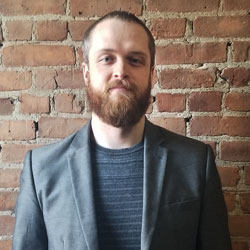SIS Assistant Professor Ben Horne to Moderate Panel on Social Media and the Rise of Extremism

SIS Assistant Professor Ben Horne has focused much of his research on how misinformation and disinformation spreads online – a topic that has been pushed to the forefront this past year as internet conspiracy theories and extremism have been connected to the January 6, 2021 U.S. Capitol riot. While it may be a fairly new concept for the general public, Horne and others who conduct similar research have long known about this insidious dark side of the internet.
“There’s a lot of people who have opinions on extremism on platforms because it’s gained mainstream light due to recent events, but it’s important to take into account experts who have been studying it for years. It’s not suddenly a topic due to one event, it’s been growing for some time,” Horne said. “We want to have experts to discuss what is really going on.”
In that vein, Horne will moderate an upcoming panel featuring three experts discussing this topic – “The Rise of Extremist Movements on Social Media: A Conversation with the Experts” – during the University of Tennessee’s Social Media Week. This panel will be 1-1:50 p.m. Feb. 24, and you can join it via Zoom at https://tennessee.zoom.us/s/95338519342.
Social Media Week is open to anyone who wants to attend, and Horne is encouraging information sciences students to pop into this session to learn more about topics such as content moderation, information sharing, and user behaviors.
“A lot of (SIS students) will get jobs where they’re analyzing or building information systems, and you can think of these social networks as information systems that are dealing with the problem of content moderation right now. So having a discussion about content moderation and how a system is being impacted by the behavior of users is a good discussion for our future graduates who may deal with this very same problem,” he said.
Horne said this line of research can get so heavy at times that he has to step back from it and take a break. He’s recently started studying users who move to alternative platforms so they can share unmoderated content.
“There’s a reason you don’t want this type of material to be exposed too broadly in the public. Researchers have expressed it’s hard to do qualitative and quantitively research on these platforms just due to how dark it is, but someone has to do it,” Horne said. “Attending this panel will give you an in-depth perspective you may not get from the news right now.”
Horne reached out through his connections to get these experts to be on the panel:
- Assistant Professor Jeremy Blackburn, Department of Computer Science, Thomas J. Watson School of Engineering and Applied Sciences, Binghamton University, State University of New York. Blackburn joined the Department of Computer Science at Binghamton University in fall 2019 as an assistant professor and is broadly interested in data science, with a focus on large-scale measurements and modeling. His largest line of work is in understanding jerks on the internet. His research into understanding toxic behavior, hate speech, and fringe and extremist Web communities has been covered in the press by The Washington Post, the New York Times, The Atlantic, The Wall Street Journal, the BBC and New Scientist, among others.
- Assistant Professor Cody Buntain, director of the Information Ecosystems Lab, Department of Informatics, Ying Wu College of Computing, New Jersey Institute of Technology. Buntain is an assistant professor of Informatics and director of the Information Ecosystems Lab at the New Jersey Institute of Technology, where he studies social media and online political engagement, especially during disasters and times of unrest. This work includes modeling coordinating actors, mis-/disinformation campaigns, ideological bias, and ecosystem-wide effects of platform moderation strategies.
- Research Director Joan Donovan, Shorenstein Center on Media, Politics and Public Policy, and Adjunct Lecturer in Public Policy, John F. Kennedy School of Government, Harvard University. Donovan is the research director of the Shorenstein Center on Media, Politics and Public Policy and leads the field in examining internet and technology studies, online extremism, media manipulation, and disinformation campaigns.Donovan’s research and teaching interests are focused on media manipulation, effects of disinformation campaigns, and adversarial media movements.